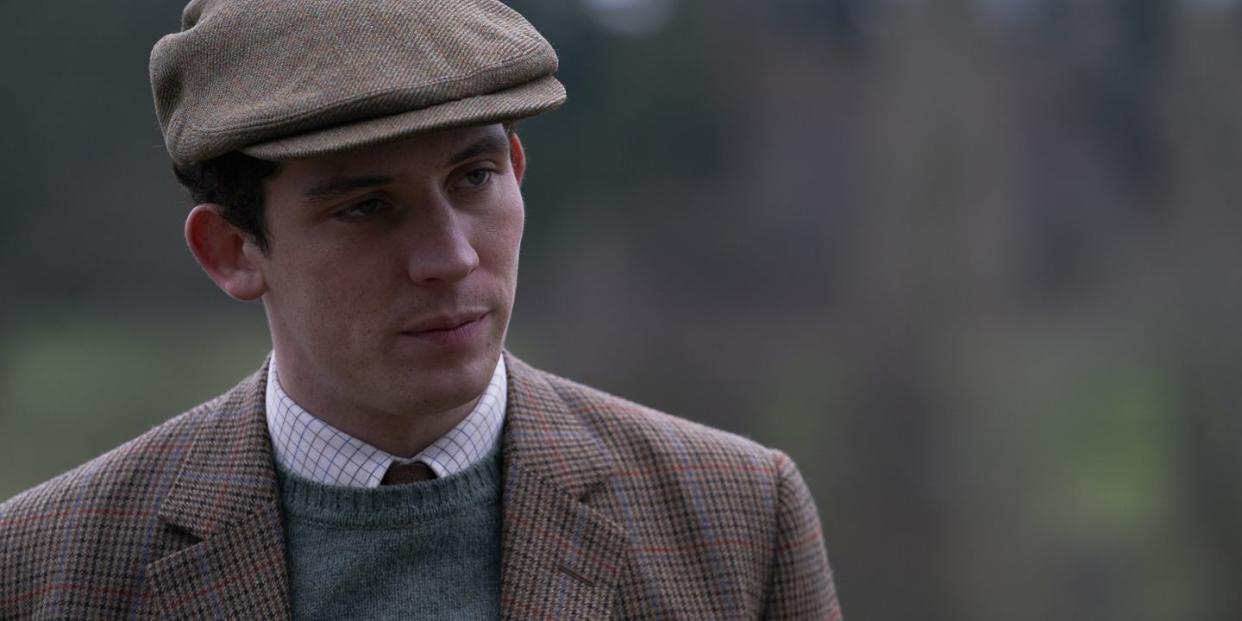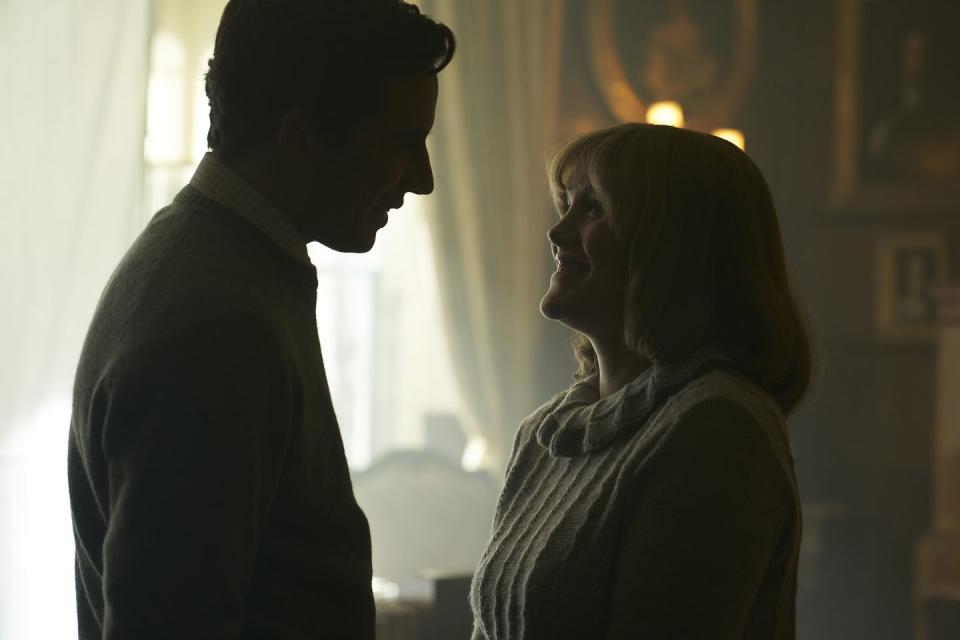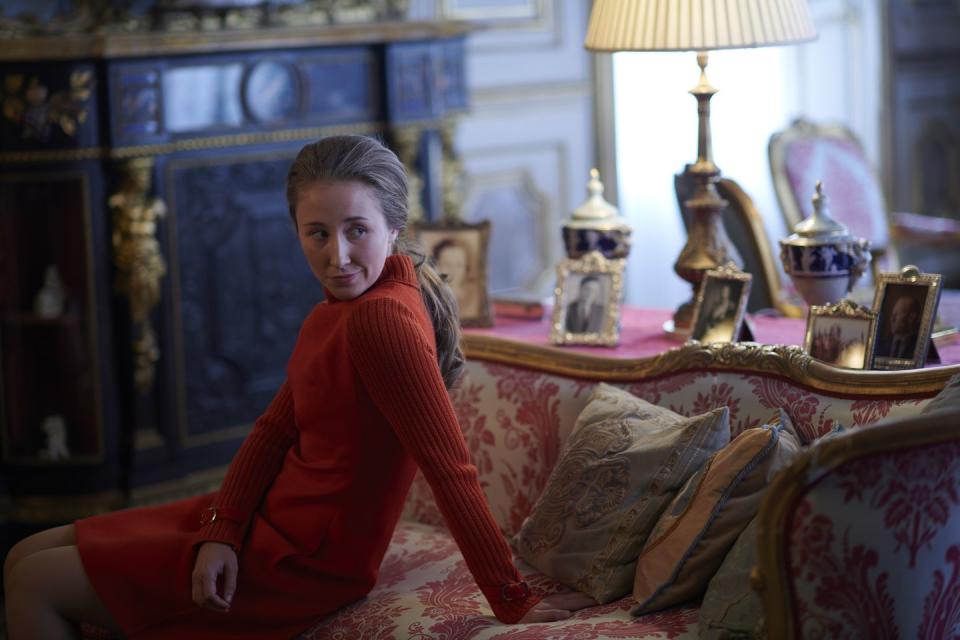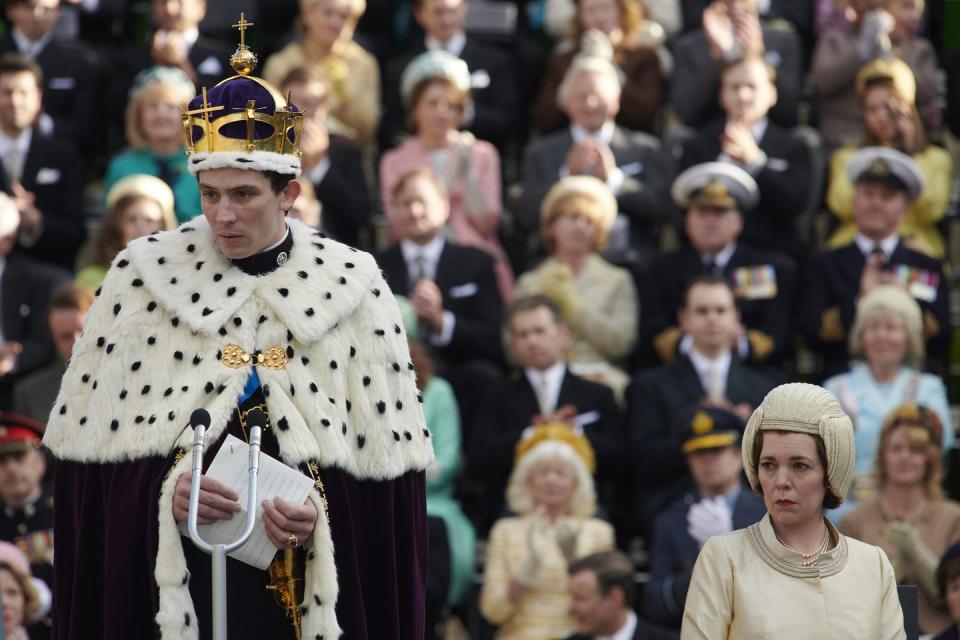The Crown’s Prince Charles Has a “Strained” Relationship with the Queen

While the queen still reigns supreme in The Crown’s third season, a new generation of royals are making their mark both in the show and in the British monarchy. Enter Prince Charles, the eldest child of Queen Elizabeth II and Prince Philip, the next in line for the throne, a theater kid at heart, and the royal family’s resident softboy.
After enduring childhood struggles with boarding school in Season 2, he arrives in Season 3 as a young man, grappling with the ever-looming prospect of succession, stepping into his role as the Prince of Wales, misunderstood by his parents, and lovestruck by Camilla Shand, whom we now know as the Duchess of Cornwall.
The recurring theme for Charles is clear: He’s an outsider. Royalty doesn’t feel right for him yet. His personal interests are stifled by family and duty, like acting (which Philip shuts down as “frivolity”) or Camilla (who breaks up with him after relatives meddle in their relationship). In Wales, nationalist residents disapprove of him as a “foreign” ruler. At Aberystwyth University, where he studies the Welsh language and culture to ease political tensions, students are unwelcoming. Luckily, his younger sister, Princess Anne, offers much-needed support, brutal as she is.
While the world may be itching to watch Charles on-screen with Princess Diana, who arrives in Season 4 and is portrayed by newcomer Emma Corrin, Season 3 lays out what the Prince of Wales was already wrestling with before his world was further turned upside down by their romance.
Here, breakout star Josh O’Connor talks to BAZAAR.com about portraying the longest-waiting heir in history and what’s in store for his next act.
I read in an interview that your ears helped you get the part, is that true?
[Laughs.] I mean, hopefully, I like to think that I got it just off merit. But, no, I’m sure my ears saved them money on prosthetics.
What was your first day on set like?
It was strange. I came in sort of halfway through shooting really, so everyone had already been getting to know each other and had some time. And I knew some of the cast; I had worked with Olivia [Colman] before, I’ve worked with Erin [Doherty], and couple of others before, Ben Daniels. But I guess that was part of the plan, to keep Charles separate from everyone, to isolate him. That was quite nice I think.
What do you think was the purpose of keeping him isolated?
For Season 3, I think he has to feel separate from the family. What we saw at the end of Season 2, him being sent off to boarding school, that doesn’t suit him at all. He’s a more sensitive soul and to be sent off to boarding school to experience Philip’s upbringing and the more tough and brutal aspect of schooling.
I think we continued that here, and I think he has to feel isolated, removed from the family, a sort of Lone Ranger really. Then, obviously, when Camilla arrives, he has a kind of ally or someone on his side.
I did notice Charles's loneliness juxtaposed with his refreshing relationship with Camilla. What did you make of that dynamic between those two characters?
When we see Charles with the queen or with his father, there was the sense of that relationship being strained, and there’s a kind of inability to communicate. I think for the Camilla relationship, it’s all about making that really easy, making it kind of fun and light so that we see quite a sweet Charles, but it’s sort of like a playful Charles.
Ultimately, we all know what’s going to happen in Season 4 with a lot of the Diana years and where that went. I think it sets us up in a way where perhaps we feel some sympathy for Charles, some understanding of his playfulness and his rejection from the family. Camilla offers that, I guess, the playful side of Charles.

Did you have to approach this relationship, which is very public in real life, sensitively?
To a point. I watched series one and two, I’m a great fan of the show, and I think you have to give credit to the audience’s intelligence and that sensitivity to understand that these are very much characters, and this is very much a work of fiction and drama. You have to hope and assume that audiences will understand that’s what it is, rather than link this too heavily to reality. We are working in fiction. But I guess there is a kind of responsibility to misrepresent. I think Peter Morgan [the show creator] writes in a way that it never feels biased or never feels like it’s a lack of understanding to one side.
That confrontation between Charles and the queen after his investiture was really interesting, where Charles goes up to her room and she brings up this point of conflict with his speech, which leads to Charles admitting that he feels like he isn’t heard. What was making that scene like? There’s a tension between mother and son, but real-life Olivia Colman is just a force that you want to be drawn to.
Well, as you say, Olivia in real life, so warm and playful and fun and whatever. But you can be playful and fun with Olivia, and then next thing you know within moments, she can flick it on like a switch and you’re suddenly doing something totally different and being captured in this moment. It’s always hard to play that kind of coldness, I imagine.
I think the key to that scene, the thing that Olivia has that makes her performances so profound, in my opinion, is because of her warmth; it means that when she plays cold, it’s kind of shocking. It’s quite alarming. It’s always quite hard to do that. But whenever they called “cut,” we’re sort of joking around.
We didn't see as much on-screen of Charles and Philip alone together the way that you see him with the queen. Did you and Tobias Menzies discuss the unspoken father-son relationship they might've had?
We didn’t see much this series. We’re going to see a bit more in series four. Tobias and I’ve spent a bit of time together and worked that out. Tobias seems to like to work in a similar way to me; we both love to talk about themes and break down relationships of characters. We’ve been really fortunate to have the time to do that for each other.
In my head, [Charles and Philip] are just not compatible, really. Princess Anne, I suppose, fits in better with Philip, whereas Charles is more sensitive, more emotionally articulate. We certainly talked about that, but as you say, it’s touched on, but not brilliantly, not extensively in this series. But certainly, the aim is to do a bit more of that, share a bit more of that in series four.
I love the brother-sister relationship between Charles and Anne. Just seeing her being whip-smart and that scene where she punches you in the stomach, I got a chuckle out of that.
Yeah, me too. It’s one of my favorite scenes. It’s played so perfectly, because it’s actually a very British thing to kind of undercut any sort of kindness or warmth or emotion with the sort of act of physical violence. It’s very sibling-y, and I loved that moment.

Since you and Erin Doherty worked together before, did that help bring that bond on-screen?
We technically worked together, but I think maybe we met once and spoke for, like, 10 seconds. So we started over on The Crown. Erin, myself, and Olivia were all on an adaptation of Les Miserables together, so we all worked on that in the knowledge that we were about to go on The Crown, but we never really actually shot anything together. So we kind of all met each other. Erin and I get on very well and realized, so it certainly helped that relationship.
What did you make of the love quadrangle between Anne, Andrew Parker Bowles, Camilla Shand, and Charles?
It’s kind of shocking. The Anne-and-Andrew relationship—I mean, I don’t know the truth of that. In my opinion, it’s more of a device that helps us understand the dynamic that Camilla is in a relationship with Andrew Parker Bowles, Andrew Parker Bowles is kind of in a relationship with anyone and everyone, and Charles is in a relationship with Camilla, but actually probably really in love with Camilla.
I think the idea is that there seems to be some sort of ease amongst the privileged of just they all sort of sleep with each other. I loved that complication, but there’s no real sort of embarrassment or awkwardness about that in some ways.
Charles’s investiture scene was very grand, very solemn. Where was your head at that point? And did you have to learn to speak Welsh?
[Laughs.] I did not know any Welsh. I spent months working on the Welsh, and that whole section is something I’m really proud of, and it was sort of epic. Being in Carnarvon Castle, it’s really interesting actually, because you look at Charles and you think he’s got it.
We know now he’s just celebrated 50 years as Prince of Wales. He’s been waiting many, many years and still he’s not been crowned. The closest, as for now, he’s ever been to a kind of coronation has been the investiture. So it has double significance. But it was a really powerful scene, and I’m really glad you liked it, and I’m really proud of it.

Where is Charles at the end of the season? His family interfered with his relationship, he gets stationed overseas, and he’s still growing into his role as heir.
I think it’s an interesting place. There’s obviously that underlying feeling, the anger and the anguish and the upset that he hasn’t been able to marry the person he loves, essentially. I guess the cynicism of the meddling by the family is quite profound. If you’ve watched it since series one and two, there are echoes of how Margaret was treated, and so I guess you could describe it like a preemption of what’s to come.
There’s this scene with the queen where Charles says, “We know what this does. We know what meddling with love does in this family. We should know better.” And I think he’s right. It feels we’ve seen the repercussions of what happened to Margaret. Look what that did to her mental health, her well-being. Basically, we end the series with Charles feeling … I mean, it’s another knock back essentially and now he has to start again. And what that means for series four, of course, is with the time with Diana and things like that.
We’ve seen some photos from the Season 4 set of you starting to film with Emma Corrin. Is there anything you can say about what it’s like so far?
I mean, there’s obviously nothing I can say about the story, but in terms of filming, we just had a great time, and Emma’s doing a brilliant job, and it’s breathtakingly accurate; she looked the spitting image [of Diana], and it’s kind of extraordinary. So that’s kind of spooky. We’re well into it now. We’ve got many months left, they’ve got a few episodes in, so it’s really exciting. And I think it will be the best yet, actually. I’m really looking forward to finishing that and then getting to share it sometime in 2020, I guess.
This interview has been edited and condensed for clarity.
You Might Also Like


